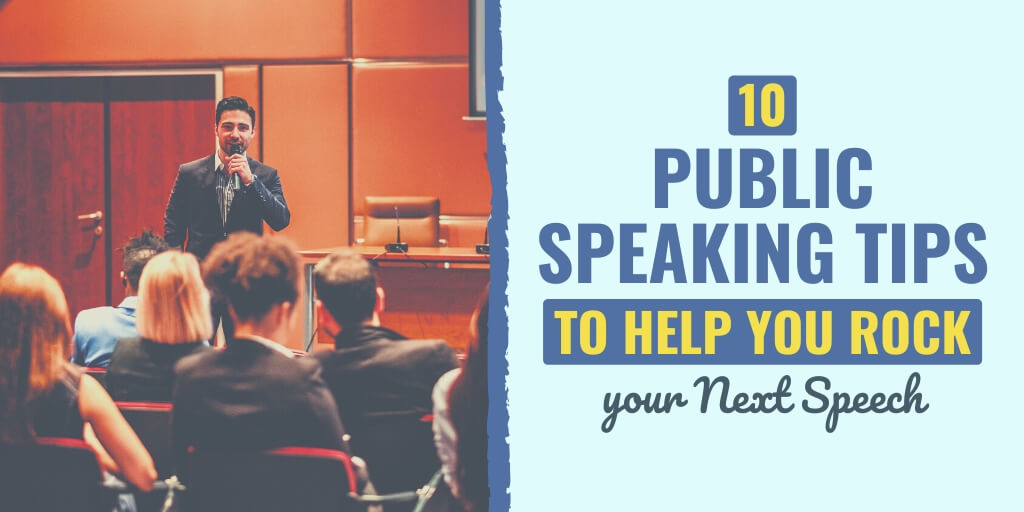Public speaking is a habit I am currently working on improving. While I am getting better, I still have a ways to go to get to where I would like to be. So I was excited when an accomplished public speaker, Ramakrishna Reddy asked to do a guest post on the site about creating a habit of improving public speaking skills. I hope you enjoy it as much as I did.
Public speaking is my passion.
However, this has not always been true. I bombed in a speech contest, in front of the whole school, when I was a child. After that incident, I used to get terrified at the thought of public speaking. My journey to being a proficient public speaker was a slow, long, and bumpy one.
I was able to improve, however, mostly by competing in speech contests conducted by Toastmasters International, a leading non-profit for communication and leadership.
I have been competing for more than 5 years, I have won more than 25 contests ranging from persuasive to entertaining speeches.
(Side note: Another positive way to improve your life is to read and learn something new every day. A great tool to do this is to join over 1 million others and start your day with the latest FREE, informative news from this website.)
Today, I am going to share with you 10 habits that will help you to rock in public speaking. These public speaking tips can improve your skills or give you that base from which to grow.
Let’s get started.
1. Journal Your Experiences
It is always best to speak from experiences. People have a short-term memories. If we do not keep a journal of the experiences, all the good stories will be forgotten.
If you can journal your experiences as often as you can, you’ll have tons of data when you actually need to prepare for a presentation. Use a simple notebook or a word document as your journal. Spend around 10 minutes logging your thoughts every night or day.
Recently, I wanted to participate in a persuasive speech contest. While browsing through my files, I found a word document about the concept of ‘Work in Progress’ that I had written a few years ago. I had written a stream of 2,000 words.
This file came in very handy. Of course, I spent time rewriting it, but I had something to start my preparation. Every day, if you can write one thing that you've learned, it will be a great resource when you actually need content for a presentation.
2. Observe Great Presentations
As children, we learn most of things by emulating what our parents, siblings, teachers or friends do. The same is true with speeches.
I don’t mean you should copy. I mean you imbibe good characteristics by watching truly amazing speakers. I remember watching Sir Ken Robinson speak about education at TED.
There was so much to learn from his talk – sense of humor, use of dialogue, conviction level. I probably watched that video for more than 25 times. I got inspired about his public speaking skills more than his message about education system.
You may have a different taste. You can watch and follow who inspires you. When you follow them, you unconsciously learn a lot of things purely by the science of osmosis. Of course, you need to be true to who you are.
You see, we are in an age where all presentations are available just a click away in Youtube or TED.com.
By sitting in your couch, you can watch Steve Jobs classic Stanford commencement speech, “Live before you die“. Or you can watch how Tony Robbins gives an awesome talk ‘Why we do what we do’.
All the good stuff is out there for free. You just need to get into a habit of regularly watching these presentations with an eye for the little things that can help you improve your own public speaking.
3. Be Health Conscious
What does health have to do with speaking? It might sound silly, but if you want to be a good presenter, you need to take care of your health.
You cannot control all the things. However, you should control things that can be controlled. For example, I do not drink cold water or cold drinks for a few weeks before I have an important presentation or contest.
Not only that, your vocal chord works better when you drink normal or warm water. I don’t want to get into diet or foods that you should or should not have.
All I am trying to say is that you have to be responsible about your health. Your audiences will unconsciously feel your credibility when you seem to be fit and healthy.
Don’t go crazy over diets. Just simple habit of having warm water, eating more natural food, and even 15 minutes of jogging or cycling can do the magic. All simple things that Steve talks about in posts like daily routines and fitness routines.
4. Find a Mentor
Even though there are many public speaking tips you can find and learn on your own, there is nothing like having a mentor.
A mentor can show you areas that you won’t be able to see. A mentor can advise you on what is right, what is wrong and how to do it correctly. You might ask: “how do you find a mentor?”
It is simple. Anybody who is good in public speaking can be your mentor. If you have a relationship with someone good at public speaking, ask him to mentor you. In fact a mentor could be your co-worker or teacher, or your friend.
However, there are few things that you need to know. Once you get into a mentor/mentee relationship, the one thing you have to highly regard is your mentor’s time. Never take it for granted.
Another important thing is that you need to trust your mentor. Sometimes your mentor might say things that you don’t want to hear.
Even though I had multiple mentors, the one I adore is Jerry Aiyathurai. He is a TED speaker, World Champion of Public Speaking finalist and an amazing person.
When I met him a few years ago, I had a good understanding of public speaking. However, I was truly amazed about the insights he gave me. It just blew me away. Having a mentor will make public speaking much easier.
5. Ask “WHY”
Do you feel nervous or have some sort of fear when someone asks you to give a presentation? I suppose many of us do. This habit will help you dissolve that fear.
The habit of asking WHY you are giving the presentation is fundamental to overcome your anxiety. It gives some direction to your presentation.
Let me give a practical scenario.
In most of the cases, someone will invite you to speak. The person is called the presentation planner. Even if your boss is asking you to take a session, he is playing the role of a presentation planner. The presentation planner is your ally.
The more WHYs you ask the planner, the easier it is for you. Get into the habit of interviewing the presentation planner and for example, ask, “Jim, why do we need this presentation?”
He might give you some pointers. Let’s say he says, “We need to empower our staff to handle the pressure of releasing the new product within one month”.
The presentation planner could be anyone – a priest in your church, or principal of a school, or a social activist running an orphanage. Sometimes, you might not get a direct answer for your WHY.
In that case, use your common sense and find the possible reasons. Suppose the priest asks you to talk to young children at church and he does not give specific answers for your WHY, the possible reason could be that the priest wants the children to get inspired and do better in life.
Answering the WHY will help you with clarity about your presentation.
One way to hone in your “why” is to know your goals. Here are some SMART goals examples that will help you improve your public speaking.
6. Write Down the Presentation Content
Are you a natural speaker? Do you think, “I am going to speak, why should I write it down?”
There are natural speakers out there, who can give solid speeches off the cuff, without having a single word written down. That is, however, the exception.
For most people writing down the presentation is the only way to deliver a clear presentation. Even those “natural speakers” can usually do a better job with some form of outline to make sure their narrative does not wander.
Since you have a journal (Remember Habit 1!), sort through the files to find relevant content that can be used for your talk. The goal of writing is not for reading it out or memorizing, the goal of writing is for improvising the content.
If you put your thoughts on paper and look at it after few days, I am sure, you’ll wonder “Oh. That does not make sense”.
Then, you’ll re-write the portion that did not make sense. You cannot write the final version the first try. To get to the 10th version, you need to start writing the first version!
Lincoln’s Gettysburg address is still being talked even after a century. One main reason is that it was written and rewritten multiple times.
When preparing for your presentation, setting goals is important. Learn what to avoid when setting writing or public speaking goals by watching the video below:
7. Internalize the Content
Have you ever forgot some content in middle of a talk and rolled your eyes? This is what happened during my first horrible speech.
Internalizing your presentation will help you solve this problem. Internalizing is the process where you start drilling the content, as many times as possible till you no longer have to think about the words.
You can do this even when you are doing regular mundane activities – driving your car, watching television, taking shower, etc. I mean drill the speech till the content becomes part of you.
If someone wakes you up in middle of your sleep and ask you to talk about your presentation, you should talk. We are not talking about storing it in memory. We are talking about storing it in your muscles.
Your aim is to take your speech to MUSCLE MEMORY. Once the content is free flowing, your body language and voice modulation will automatically become good.
If you are not able to follow any other habit, but follow this one habit – you’ll become twice (maybe even 10 times) as effective as you used to be.
8. Care for the Audience
When you are “live” before an audience, do you get concerned about what the audience will think about your language, clothes, background, etc.? These things matter to a certain extent, but they are not worth your attention when delivering a speech.
As a speaker, people are generally classified into three levels.
1. You are only concerned about you.
You think: “Am I going to deliver without making any mistakes”, “Am I dressed properly”, etc.
2. You are concerned about your content.
You think: “Is the listener getting what I am saying” or “Is my message good enough for them”. You can get flustered if there are any disturbances such as PowerPoint do not work, or power shuts down, etc.
3. You really care for the audience.
Whatever the situation, you will be cool. You are only concerned about making a difference in your listener’s life. You present with genuine love and care in your heart.
This will help you to care for your audience and you’ll really rock! I have seen this umpteen number of times – irrespective of the mistakes, nervousness, the one who cares more for the audience, wins.
9. Get Feedback
Have you filled a customer satisfaction form in a restaurant? Why do they do that? They want to get better. They want to know what was good and what was bad.
Can we use this concept for our presentations? Absolutely. Get feedback from your audience. That doesn’t mean that you will bombard them with a long list of questions.
Just ask them few simple questions such as: “If I could ask you one key thing you learned from my presentation – “What would it be?” or “Did you feel that something could be done differently?”
You can even take print of few key questions and hand it over. This puts less pressure on your audience to give critical feedback. You see – feedback is a great tool.
But don't get flustered if someone gives you a critical feedback. I’ll tell you a secret to process feedback. If an expert gives you a feedback, 99% of the time, the feedback will help you even if it is critical.
However, if a regular listener gives you feedback, check if it makes sense. If not, get feedback from more people and see the pattern. 1 person can be wrong but 10 people cannot be wrong.
Let me give my example. My roots are from India, which makes me a non-native speaker. In 2013, I was competing in a speech contest in New England area, USA. Even though I had a strong script, I was not sure how to take the speech to the next level.
I delivered it to various audiences and got lot of feedback. I would have gone crazy if I had implemented all the feedback. However, there was one feedback that was constantly repeating – my voice was sometimes unintelligible.
The next level of contest was among the best speakers in the New England area so I paid $200 an hour to get voice coaching from an expert. I never paid so much money for an hour’s worth of time to anybody.
Boy, she was harsh. But you know what? She pointed out the things that I had been doing incorrectly for a long time. That was probably one reason why I could finish among the top three speakers in spite of being a non-native speaker in that contest.
10. Review the Presentation
Do you know who is the best person to judge your presentation? You probably guessed it right. It is YOU.
Try the following. Next time, when you give a talk, ask your friend to video record your presentation. Then, review the video. I am sure you’ll be humbled. You might see – repeated gesturing, unnecessary movements, and 100 other areas of improvement.
Do not get overwhelmed. Just ask yourself: “What one thing can be done better?” Take one obvious area and work on the same. Once you overcome that, focus on the next item. I challenge you to follow this habit. You’ll grow leaps and bounds as a speaker.
Well, we saw 10 habits that will train your brain in Public Speaking skills. I have covered 37 Things one must know when they start public speaking in my latest book “The Ultimate Public Speaking Survival Guide”. What’s the fun if there is no action?
Let’s have some fun. I have released one of my speeches in YouTube especially for this blog.
The speech title is ‘Magic’ and it was given at a national level speech contest. This speech is perfect for this blog and for you. You’ll know why once you watch it. Without further adieu, here is the speech video.
Final Thoughts on Public Speaking Tips
We hope these public speaking tips have been helpful in boosting your confidence and improving your communication skills. Remember, public speaking is a skill that can be learned and mastered with practice and persistence.
Whether you're presenting to a small group or speaking in front of a large audience, remember to breathe, maintain eye contact, and engage your listeners through storytelling and passion.
Embrace the opportunity to share your knowledge and ideas with others, and don't be afraid to let your authentic self shine through.
Go out there, embrace the stage, and make a lasting impact with your words.
And if you're looking fore more resources to help improve your public speaking skills, check out these blog posts:
- 18 Top Motivational Speakers in the World
- 13 SMART Goals Examples for Improving Your Communication Skills
- 9 Ways to Be a Good Communicator Throughout Your Life
Finally, if you want another positive way to improve your life, then read and learn something new every day. A great tool to do this is to join over 1 million others and start your day with the latest FREE, informative news from this website.
Ramakrishna Reddy is an award-winning and passionate speaker who has won more than 25 speaking contests comprising from entertaining to inspiring speeches, based out of India as well as from United States. He is the author of three books related to Public Speaking. He works for a Multinational alternatively out of India and the United States. He is the creator at www.PublicSpeakKing.com





Great tips,
I’ve had my ego busted in many toastmasters competitions, and liked that you ended with: Review The Presentation.
Too many amateurs never record their speeches, and never improve. I know that it can be tough at first, but very rewarding.
Great speaking tips! I’ve always been deathly afraid of public speaking and have never felt comfortable standing in a small group speaking. I completely agree that you must write it down and rehearse…winging it off the cuff has never worked for me.
Thank you Sandra…yes, one simple but most overlooked way is to be so confident of your content that you get excited instead of getting afraid. All the very best for your future presentations!
Some really good tips.
Most of my public speaking is in my local church when I say the prayers to about 200 people. It is a captive audience and you have to be solemn.
At my daughters wedding my speech was a mix of fun and seriousness and it seemed to go down extremely well.
I guess my point choose your speaking style to the audience
Hi Frank,
Thank you for your kind words.
Speaking regularly to 200 people seems to be a great habit for your speaking muscle :).
Thanks for sharing that cool insight… As a speaker, we got to tailer our style to suit the occasion and audience!
YOu are right! The mirror trick is an awesome way to practice.
This is some really good information about making good motivational presentations. I liked that you pointed out that you should watch people who do good presentations. That would totally help me because I am not that creative.
Very helpful!
Doing a speech and very scared. These 10 tips will help a lot. Okay bye…:)
Hi..
Nice article for all those who are shy to talk in public this article builds there confidence for talking in public.
Thanks for Posting..
Thank you for sharing this tips. Effective public speaking requires years of dedication and strenuous practice to master. You can not expect to simply ‘do it’ and become great on your own. It requires constant monitoring, mentoring and refinement. One of the best public speaking classes i know is Limitlesseq in Mumbai with well experienced staff. Keep sharing such articles.